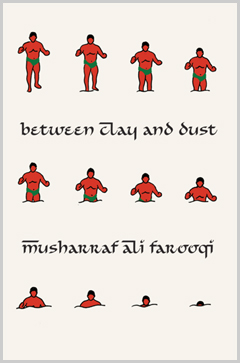Celia recommends Between Clay and Dust by Musharraf Ali Farooqi:
 Between Clay and Dust is many things—a twilight romance, a coming of age story told from a distance, an elegy for a lost world. Set in Pakistan just after the partition of India and the end of the British colonial regime, the novel follows Ustad Ramzi, the head of a renowned wrestling family, and Gohar Jan, a once celebrated courtesan who finds herself increasingly alienated from her community. The two share a quiet, unconsummated romance, for Ustad Ramzi has taken a vow of celibacy, and Gohar Jan has sworn never to devote herself to one man. While their relationship provides the story’s framework, the novel expands outwards, asking what kind of legacy this pair can leave in a society undergoing changes that may leave each of their professions unrecognizable. The effect is of watching a story unfurl through a telescope: every detail stands out clear and visible, and yet you have the feeling that the things you are seeing are already lost, and if you reach out to touch them you’ll find only air.
Between Clay and Dust is many things—a twilight romance, a coming of age story told from a distance, an elegy for a lost world. Set in Pakistan just after the partition of India and the end of the British colonial regime, the novel follows Ustad Ramzi, the head of a renowned wrestling family, and Gohar Jan, a once celebrated courtesan who finds herself increasingly alienated from her community. The two share a quiet, unconsummated romance, for Ustad Ramzi has taken a vow of celibacy, and Gohar Jan has sworn never to devote herself to one man. While their relationship provides the story’s framework, the novel expands outwards, asking what kind of legacy this pair can leave in a society undergoing changes that may leave each of their professions unrecognizable. The effect is of watching a story unfurl through a telescope: every detail stands out clear and visible, and yet you have the feeling that the things you are seeing are already lost, and if you reach out to touch them you’ll find only air.
I love Farooqi’s simple and precise prose, which rarely flaunts its presence, but dwells lovingly on details. A wrestler training for an important fight wakes up in the morning and drinks “milk in which the flowers of blue lotus and barberries, sandalwood powder, dry endive, myrobalan, and green cardamoms had been soaked,” does a grueling exercise regimen, and then rests and eats “a kilo of rabri…one and a half kilos of roast meat…a preparation of gold foil, pearls, and green cardamom in butter,” and, in cold weather, “a soup made from five chickens.” The novel describes the emotional lives of its characters with the same precise simplicity. Gohar Jan, hurt by Ustad Ramzi’s reticence towards her, reflects that “the graciousness that allowed people to accept and grant small kindnesses had no place in Ustad Ramzi’s heart. For the first time, it also occurred to her that it gave him a certain privilege in his relationships: he could neither be dismissed as a stranger nor held to any commitment to anyone.”
While Ustad Ramzi and Gohar Jan are both childless, each has an heir, and much of the novel is devoted to exploring what their legacy will be. Ustad Ramzi has a troubled relationship with Tamami, his much-younger brother. Tamami should by rights be the heir to the wrestling clan, but his rocky relationship with Ustad Ramzi keeps him from taking up his brother’s mantle. Ustad Ramzi is strict with himself and others, while Tamami is both wildly ambitious and painfully sensitive. As much as they both want the same thing—to reconcile and preserve their family’s legacy—neither knows how to accommodate the other’s feelings. Gohar Jan, meanwhile, has an adopted daughter, named Malka, who loves her dearly—but as the courtesan’s patrons die, lose their wealth, or abandon her, Gohar Jan decides that she cannot let Malka pursue the life that she herself has led, and resolves to send her away to a different kind of future.
There is no exact answer to what the future can hold, only questions. Malka passes out of the novel and into a new life, which Farooqi’s readers do not get to see. As for the rest—it is a story of how things end.
